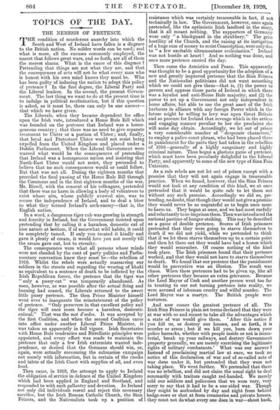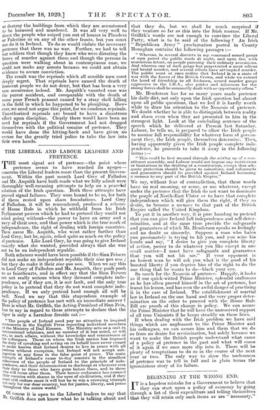TOPICS OF THE DAY.
THE NEMESIS OF PRETENCE. THE condition of murderous anarchy into which the South and West of Ireland have fallen is a disgrace to the British nation. No milder words can be used; and what is more, all the excuses commonly employed, the unrest that follows great wars, and so forth, are all of them the merest shams. What is the cause of this disgrace ? Pretending that things are not what they are, and that the consequences of acts will not be what every man who is honest with his own mind knows they must be. Who has been guilty of inducing the nation to adopt this policy of pretence In the first degree, the Liberal Party and the Liberal leaders. In the second, the present Govern- ment. The last thing we want to do at the present time is to indulge in political recrimination, but if this question is asked, as it must be, there can only be one answer— that which we have given. The Liberals, when they became dependent for office upon the Irish vote, introduced a Home Rule Bill which was founded on the pretences that Ireland was a homo- geneous country ; that there was no need to give separate treatment to Ulster or a portion of Ulster ; and, finally, that loyal and Protestant Ulster would not resist being expelled from the United Kingdom and placed under a Dublin Parliament. When the Liberal Government were warned what would be the consequences of pretending that Ireland was a homogenous nation and insisting that North-East Ulster would not resist, they pretended to believe that no such consequences would or could follow. But that was not all. During the eighteen months that preceded the final passing of the Home Rule Bill through the Commons and in the first eighteen months of the war, Mr. Birrell, with the consent of his colleagues, pretended that there was no harm in allowing a body of volunteers to exist whose aim, whose publicly avowed aim, was to secure the independence of Ireland, and to deal a blow to what they termed Ireland's arch-enemy—that is, the English nation.
In a word, a dangerous tiger cub was growing in strength and ferocity in Ireland, but the Government insisted upon pretending that by calling it a harmless, domestic cat of nice nature at bottom, if of somewhat wild habits, it could be completely tamed. If only you treated it kindly and gave it plenty of cream, it would love you not merely till the cream gave out, but to eternity.
The consequences were what all persons whose minds were not clouded by the cant of party politics and Parlia- mentary convention knew they must be—the rebellion of 1916. Whilst the rebels were actually massacring our soldiers in the streets and regarding the wearing of khaki as equivalent to a sentence of death to be inflicted by the Irish Republican forces, the pretence that the tiger was " only a pussy-cat " was temporarily abandoned. As soon, however, as was possible after the actual firing and burning had ceased, the Liberals returned to the sweet little pussy pretence. The then Prime Minister himself went over to inaugurate the reinstatement of the policy of pretence. " Only persevere in that excellent policy and the tiger will once more become a harmless, domestic animal." That was the mot d'ordre. It was accepted by the first Coalition, and when the second Coalition came into office under another Liberal Prime Minister, it was taken on apparently in full vigour. Irish Secretaries with Home Rule tendencies and Birrellistic principles were appointed, and every effort was made to maintain the pretence that only a few Irish extremists wanted inde- pendence, or desired that the Germans should win, or, again, were actually succouring the submarine campaign not merely with information, but in certain of the creeks and inlets of the Irish Coast with supplies of oil, and even food.
Then came, in 1918, the attempt to apply to Ireland the obligation of service in defence of the United Kingdom which had been applied in England and Scotland, and responded to with such gallantry and devotion. In Ireland not only did individuals resent and reject this necessary sacrifice, but the Irish Roman Catholic Church, the Shin Feiners, and the Nationalists took up a position of resistance which was certainly treasonable in fact, if not technically in law. The Government, however, once again pretended, like the optimistic Irish landlord in the story, that it all meant nothing. The supporters of Germany were only " a blackguard in the shrubbery." The grim hostility of the Church, and the raising at its instigation of a huge sum of money to resist Conscription, were only due to " a few excitable ultramontane ecclesiastics." Ireland was not hostile at heart ! And so nothing was done, and once more pretence carried the day.
Then came the Armistice and Peace. This apparently was thought to be a good opportunity for the adoption of a new and greatly improved pretence that the Sinn Feiners and the Nationalist politicians did not want something which we could not give them—that is, (1) the power to govern and oppress those parts of Ireland in which there was a loyalist and anti-Home Rule majority, and (2) the power to set up a Government not only independent in home affairs, but able to use the great asset of the Irish harbours in affiance with any foreign Power which in the future might be willing to levy war upon Great Britain and so procure for Ireland that revenge which in the artless and engaging manner peculiar to her she proclaims she will some day obtain. Accordingly, we let out of prison a very considerable number of desperate characters," to employ a police-court phrase, who had been placed there in punishment for the parts they had taken in the rebellion of 1916—generally of a highly sanguinary and highly criminal nature. Thus began a glorious game of pretence, which must have been peculiarly delightful to the Liberal Party, and apparently to some of the new type of Sinn Fein Unionists.
As a rule rebels are not let out of prison except with a promise that they will not again engage in treasonable practice. When we found, however, that the Sinn Feiners would not look at any condition of this kind, we at once pretended that it would be quite safe to let them out without any such promise. Accordingly we did so, pre- tending, no doubt, that though they would not give a promise they would never be so ungrateful as to begm once more to harm us. They began at once, and we had most ruefully and reluctantly to re-imprison them. Then was introduced the national pastime of hunger-striking. This may be described as a game of double pretence. Scores of Irish prisoners pretended that they were going to starve themselves to death if we did not yield, while we pretended to think that if we let them starve themselves up to a certain point and then let them out they would have had a lesson which they would remember. Of course nothing of the kind took place. The Irish prisoners found that their pretence worked, and that they would not have to starve themselves to death. We found that our pretence that the punishment would be preventive was an illusion. The result was chaos. When these pretences had to be given up, like all other pretences they became an extra grievance. Because the Lord Mayor of Cork and another person went too far in trusting to our not turning pretence into reality, we were accused of inhuman cruelty and wilful murder. The Lord Mayor was a martyr. The British people were torturers.
And now comes the greatest pretence of all. The Irish Sinn Feiners in plain set terms declared that they were at war with us and meant to take all the advantages which a state of war would give them. ' After this notice if you kill us, or destroy our houses, and so forth, it is murder or arson ; but if we kill you, burn down your police barracks, whether with people inside or not is imma- terial, break up your railways, and destroy Government property generally, we are merely exercising the legitimate rights of military combatants.' What was our answer ? Instead of proclaiming martial law at once, we took no notice of this declaration of war and of so-called acts of war done under it, but pretended that they were not taking place. We went further. We pretended that there was no rebellion, and did not claim the usual right to deal summarily with traitors caught red-handed. We merely told our soldiers and policemen that we were very, very sorry to say that it had to be a one-sided war. Though they might be ambushed by day and night from behind hedge-rows or shot at from creameries and private houses, they must not do what every one does in war—shoot back, or destroy the buildings from which they are accustomed to be harassed and murdered. It was all very well to shoot the people who sniped you out of houses in Flanders or Palestine or on any of the other fronts, but you must not do it in Ireland. To do so would violate the necessary pretence that there was no war. Further, we had to tell oar soldiers that though they knew who were directing the forces of murder against them and though the persons in question were walking about in contemptuous ease, we could not make any arrests because we could not obtain evidence to secure conviction.
The result was the reprisals which all sensible men most deeply regret. That reprisals have caused the death of innocent people we do not deny, but that has been a very rare occurrence indeed. Mr. Asquith's vaunted case was the purest accident, and comparable with the death of some poor French peasant caused by a stray shell falling in the field in which he happened to be ploughing. How- ever, we need not argue this point, for we condemn reprisals. Unauthorized reprisals are bound to have a disastrous effect upon discipline. Clearly there would have been no need for reprisals if the Government had not drugged themselves with the political cocaine of pretence. They would have done the hitting-back and have given no excuse for the greatly tried police to take the law into their own hands.







































 Previous page
Previous page